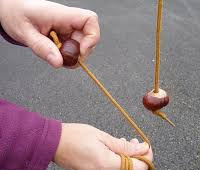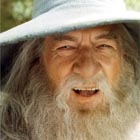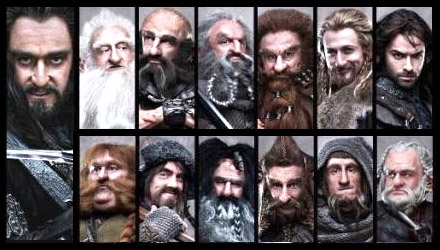The text below is from the [ original novel ]. You can also read a [ shortened version ] of the novel.
- Which parts of the video are the same as the novel?
- Which parts of the video are different from the novel?
- Which parts of the novel are not in the video?
Just before tea-time there came a tremendous ring on the front-door bell, and then he remembered! He rushed and put on the kettle, and put out another cup and saucer, and an extra cake or two, and ran to the door. “I am so sorry to keep you waiting!” he was going to say.
Then he saw that it was not Gandalf at all. It was a dwarf with a blue beard tucked into a golden belt, and very bright eyes under his dark-green hood. As soon as the door was opened, he pushed inside, just as if he had been expected. He hung his hooded cloak on the nearest peg, and “Dwalin at your service!” he said with a low bow.
“Bilbo Baggins at yours!” said the hobbit, too surprised to ask any questions for the moment. When the silence that followed had become uncomfortable, he added: “I am just about to take tea; pray come and have some with me.” A little stiff perhaps, but he meant it kindly. And what would you do, if an uninvited dwarf came and hung his things up in your hall without a word of explanation? They had not been at table long, in fact they had hardly reached the third cake, when there came another even louder ring at the bell.
“Excuse me!” said the hobbit, and off he went to the door.
“So you have got here at last!” That was what he was going to say to Gandalf this time. But it was not Gandalf. Instead there was a very old-looking dwarf on the step with a white beard and a scarlet hood; and he too hopped inside as soon as the door was open, just as if he had been invited. “I see they have begun to arrive already,” he said when he caught sight of Dwalin’s green hood hanging up. He hung his red one next to it, and “Balin at your service!” he said with his hand on his breast.
“Thank you!” said Bilbo with a gasp. It was not the correct thing to say, but they have begun to arrive had flustered him badly. He liked visitors, but he liked to know them before they arrived, and he preferred to ask them himself. He had a horrible thought that the cakes might run short, and then he—as the host: he knew his duty and stuck to it however painful—he might have to go without. “Come along in, and have some tea!” he managed to say after taking a deep breath.
Balin and Dwalin began talking at the table like old friends (as a matter of fact they were brothers). Bilbo plumped down the beer and the cake in front of them, when loud came a ring at the bell again, and then another ring.
“Gandalf for certain this time,” he thought as he puffed along the passage. But it was not. It was two more dwarves, both with blue hoods, silver belts, and yellow beards; and each of them carried a bag of tools and a spade. In they hopped, as soon as the door began to open—Bilbo was hardly surprised at all.
“What can I do for you, my dwarves?” he said.
“Kili at your service!” said the one. “And Fili!” added the other; and they both swept off their blue hoods and bowed.
“At yours and your family’s!” replied Bilbo, remembering his manners this time.
“Dwalin and Balin here already, I see,” said Kili. “Let us join the throng!”
“Throng!” thought Mr. Baggins. “I don’t like the sound of that. I really must sit down for a minute and collect my wits, and have a drink.” He had only just had a sip—in the corner, while the four dwarves sat round the table, and talked about mines and gold and troubles with the goblins, and the depredations of dragons, and lots of other things which he did not understand, and did not want to, for they sounded much too adventurous—when, ding-dong-a-ling-dang, his bell rang again, as if some naughty little hobbit-boy was trying to pull the handle off.
“Someone at the door!” he said, blinking.
“Some four, I should say by the sound,” said Fili. “Besides, we saw them coming along behind us in the distance.”
The poor little hobbit sat down in the hall and put his head in his hands, and wondered what had happened, and what was going to happen, and whether they would all stay to supper. Then the bell rang again louder than ever, and he had to run to the door. It was not four after all, it was five. Another dwarf had come along while he was wondering in the hall. He had hardly turned the knob, before they were all inside, bowing and saying “at your service” one after another. Dori,Nori, Ori, Oin, and Gloin were their names; and very soon two purple hoods, a grey hood, a brown hood, and a white hood were hanging on the pegs, and off they marched with their broad hands stuck in their gold and silver belts to join the others. Already it had almost become a throng. Some called for ale, and some for porter, and one for coffee, and all of them for cakes; so the hobbit was kept very busy for a while.
A big jug of coffee had just been set in the hearth, the seed-cakes were gone, and the dwarves were starting on a round of buttered scones, when there came— a loud knock. Not a ring, but a hard rat-tat on the hobbit’s beautiful green door. Somebody was banging with a stick!
Bilbo rushed along the passage, very angry, and altogether bewildered—this was the most awkward Wednesday he ever remembered. He pulled open the door with a jerk, and they all fell in, one on top of the other. More dwarves, four more! And there was Gandalf behind, leaning on his staff and laughing. He had made quite a dent on the beautiful door; he had also, by the way, knocked out the secret mark that he had put there the morning before.
“Carefully! Carefully!” he said. “It is not like you, Bilbo, to keep friends waiting on the mat, and then open the door like a pop-gun! Let me introduce Bifur, Bofur, Bombur, and especially Thorin!”
“At your service!” said Bifur, Bofur, and Bombur standing in a row. Then they hung up two yellow hoods and a pale green one.
And also a sky-blue one with a long silver tassel. This last belonged to Thorin, an enormously important dwarf, in fact no other than the great Thorin Oakenshield himself, who was not at all pleased at falling flat on Bilbo’s mat with Bifur, Bofur, and Bombur on top of him. For one thing Bombur was immensely fat and heavy. Thorin indeed was very haughty, and said nothing about service; but poor Mr. Baggins said he was sorry so many times, that at last he grunted “pray don’t mention it,” and stopped frowning.
“Now we are all here!” said Gandalf, looking at the row of thirteen hoods—the best detachable party hoods—and his own hat hanging on the pegs.
“Quite a merry gathering! I hope there is something left for the late-comers to eat and drink! What’s that? Tea! No thank you! A little red wine, I think for me.”
“And for me,” said Thorin.
“And raspberry jam and apple-tart,” said Bifur.
“And mince-pies and cheese,” said Bofur.
“And pork-pie and salad,” said Bombur.
“And more cakes—and ale—and coffee, if you don’t mind,” called the other dwarves through the door.
“Put on a few eggs, there’s a good fellow!” Gandalf called after him, as the hobbit stumped off to the pantries. “And just bring out the cold chicken and pickles!”
“Seems to know as much about the inside of my larders as I do myself!” thought Mr. Baggins, who was feeling positively flummoxed, and was beginning to wonder whether a most wretched adventure had not come right into his house.
[ printable .pdf ]
 English
English Português
Português Español
Español 한국어
한국어




